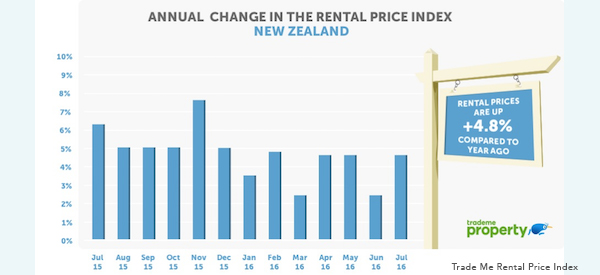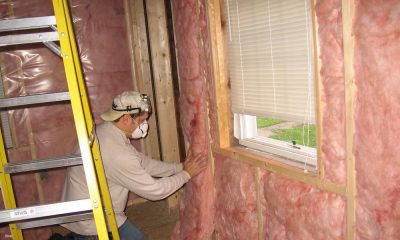Tenants
Smoke Alarms in Rental Properties
There is no question that smoke alarms are a key warning device in reducing deaths caused by fires in the home.

There is no question that smoke alarms are a key warning device in reducing deaths caused by fires in the home. According to the NZ Fire Service, smoke alarms were either not installed or not working in 80% of house fires they attended last year! There is a lot of interest and debate about whether property owners are required by law to provide smoke alarms for rental properties.
What are the current legal requirements?
The Residential Tenancies Act 1986 does not have specific sections that apply to the requirement of landlords to provide smoke alarms. However, section 45C specifies a landlord must “comply with all requirements in respect of buildings, health, and safety under any enactment so far as they apply to the premises.” This means that all houses must comply with the Building Act 2004.
The current Building Act 2004 requires that all new houses and consented alterations provide “means of detection and warning” in the event of fire. Like the Review of the Residential Tenancies Act, the Department of Building and Housing is currently preparing a Building Act Review, so changes may occur. Although the current regulation does not apply to existing properties, the requirement for alarms will usually be triggered if you are carrying out any building works that require an application for building consent from your local council.
What is the best type of smoke alarm?
The two main types of fire alarms available are Ionisation and Photoelectric alarms. Consumer.org.nz have carried out research on various alarms and report the following:
Ionisation alarms sense the volatile combustion products from hot flaming fires, but don’t do as good a job sensing the smoke from cooler smouldering fires because fewer combustion products are present.
Photoelectric alarms shine a light beam across a chamber and detect if the air in the chamber becomes partially obscured, detecting smoke from both types of fires.
The NZ Fire Service also provides some good recommendations on the types of alarms that are available. The best type will usually depend on the type of property, your budget and personal preference.
What other options are there?
Alarms can be powered from different sources. Battery Operated (DC) smoke alarms can provide detection if there is a power failure, provided they are installed correctly and the batteries are charged. This is often the most cost effective. AC powered smoke alarms are powered by mains and will only provide detection if power doesn’t fail. These can be slightly more expensive and must be installed by a certified electrician. AC with battery back up is generally the most comprehensive and will provide detection even when there is power failure – as long as batteries are fresh and correctly installed. Many smoke alarms now have long life batteries that can last up to 10 years.
Where should I install fire alarms?
All properties will generally have different requirements depending on the location, size, number of levels and exits. Generally alarms should be installed in hallways as close to the bedrooms as possible, as the alarms must be audible to people sleeping on the other side of closed doors. The bigger the home the more alarms are required and most alarms will come with instructions on where to install them. The NZ Fire Service provides some good guidelines and The Building Act 2004 provides information on the specific types of smoke alarms that are required and some guidelines on where to install them. All alarms should be installed in conjunction with the manufacturers’ instructions. There are also guidelines on where not to install them, such as kitchens.
Other important issues to consider
Smoke alarms may be ineffective if covered in dust/dirt or obstructed in any other way. This is likely to occur if tenants smoke in properties (usually flats and apartments) and cover the alarms. Many building managers will tell stories of tenants obstructing smoke detectors and some body corp rules/building regulations now prohibit this obstruction and issue fines to tenants who do this. The fire service may also charge tenants or landlords for false callouts.
Educating tenants in utilising the effectiveness of the alarms is also the key, including the potential outcomes if they obstruct alarms or fail to check them regularly. Smoke alarms will also be ineffective if they are not installed in the correct locations in the home.
Smoke alarms are also available for people with hearing impairments. These special purpose alarms provide additional warnings such as visual alarms and when one is activated, generally all activate to provide a more comprehensive warning system.
In closure smoke alarms are a single warning device and should not be relied on as a complete fire detection system. A comprehensive system would also include the use of sprinkler systems, fire-resistant materials and fire exits.
Tenants
Coworking Countdown – 4 Things to Prepare Before You Move In

The coworking scene has done anything but slowed down. Coworking spaces in Auckland alone vary between your upmarket, corporate office to the trendier, chic ones. Certainly, investing in this type of commercial real estate has never been more attractive. There is a space for everyone in this landscape and for businesses looking for new workspaces there’s not only variety available, there’s options at an affordable price.
When a business has finally found an office, in one of these buildings they have not only found a workspace, they’ve also found community as well. One coworking space – Servcorp – is a good example of the way work and networking have intersected to provide business with the chance to grow. This new way of leasing premises is highly attractive to the leasee and the property owner. Here are some tips for moving into a new coworking space, so the business can prepare to maximise their working experience.
Continue reading to learn what you can do to prepare for your move to your new coworking space to ensure the move is as seamless as possible.
Purposeful Coworking
Coworking presents professionals with the chance to use the space to just work or to build on their professional network. Before getting comfortable in your new office, sit down and take inventory of the tasks beyond work that you would like to accomplish. When writing down your goals and objectives, keep in mind the types of activities that you would like to engage in the space.
Of the many activities, formal networking events and community social events are the types you want to pay attention to if you plan to use the space to build a social network. Not that you have to be out and about every night, but scheduling time to promote your business is one way to maximise the coworking space. Ultimately, if the purpose of coworking is to build a networking platform or to grow your business, find ways to incorporate the more social aspect of the space.
Tool Of The Trade
Another thing that professionals moving into a coworking space should prepare for is knowing what amenities the space provides. Standard spaces fit out the office with exceptional IT services and office equipment, but other amenities include programs and conferences that help teach entrepreneurs how to build their businesses. Before moving into your space, consider checking out all the perks of working in your coworking space.
Moreover, make sure you know what is available for use in the office, so as to bring supplies if necessary. While staplers and other office products come standard in a conventional office, some spaces might not make this available to employees. On a larger scale, make sure there is a receptionist available, and if not, know exactly how to retrieve any messages.
Change Of Business Address
Before leaving your conventional or home office, make sure that clients and other important people know your new location and phone number. One simple way to do this is to email clients of your relocation as to avoid any mix-ups. Furthermore, make sure to forward any business mail to your new location, as to avoid missing important parcels. Finally, make sure you know the building’s office hours for scheduling appointments.
Event Calendar
Check out the coworking space’s event calendar. In addition to the numerous networking opportunities in the day, many coworking communities hold events to get the professionals to engage with each other. Make an exerted effort to attend at least a few of the events every week to raise your business’s profile. You never know what opportunity awaits when engaging people from your profession and others.
Preparing And Putting Coworking To Work
Coworking makes moving effortless simply by alleviating much of the work associated with relocating. You can, however, maximise your move by putting together an agenda of how you plan to use the work to benefit your business. Your plan will help you use your space more effectively for building a platform for business success.
Tenants
Auction Site For Renters
New Zealand will soon see the rise of a new auction site for renters. Just in on stuff.co.nz Rentberry has confirmed they will be launching here and in Australia. The online service offers renters the opportunity to bid for rental properties. Landlords set the ‘reserve’ or rent level they hope will generate lots of prospective tenants interest and then the bidding war takes off.

New Zealand will soon see the rise of a new auction site for renters. Just in on stuff.co.nz Rentberry has confirmed they will be launching here and in Australia. The online service offers renters the opportunity to bid for rental properties. Landlords set the ‘reserve’ or rent level they hope will generate lots of prospective tenants interest and then the bidding war takes off. Landlords get the final say on whom is the successful applicant and while they may review the highest bids first, they won’t be choosing the tenant just based on what they’re prepared to pay.
An Auckland property management company spokesperson said common-sense will prevail among Landlords. Securing long term tenancies with tenants that have good credit histories and references will remain the top priority. Prospective tenants information is available to the Landlord in the service so they can select the tenant without delay.
Rentberry will provide more transparency of the selection process with prospective tenants and Landlords learning what the true market value is for their property. This is a positive move for investors especially those who are new to the rental market and Landlords whom self manage their rental properties and may currently be charging more or less rent.
There has been some healthy criticism of the service even in it’s infancy. In America affordable housing advocates are angered by the service and tenant groups in Australia are wary that the service will push up prices.
Rentberry has been operating in the USA since 2016 and is currently expanding into 1000 cities there. It’s focus is on renting Apartments and this is where we see the service take off in our neck of the woods in our main centres in New Zealand.
This blog article was written for PropertyBlogs by Mobilize Mail.
Tenants
Tenants Let Off With 4.8% Increase
Weekly rents rose just 4.8 percent in the twelve months to July 2016 according to Trade Me Rent Price Index. Tenants will be relieved Landlords are being realistic and not keen on hiking rents arbitrarily. Property sales have slowed and the average asking price has dropped significantly up ten percent since July 2015.

Weekly rents rose just 4.8 percent in the twelve months to July 2016 according to Trade Me Rent Price Index. Tenants will be relieved Landlords are being realistic and not keen on hiking rents arbitrarily
Property sales have slowed and the average asking price has dropped significantly up ten percent since July 2015. Of particular interest is the slow down in property asking prices in Auckland where a typical property listed in June was just $3,750 less than the asking price in July. According to this article Investors are buying most of the houses.
In Auckland City and on the North Shore investors have purchased 50 percent of the properties on the market. A North Shore and Auckland City property management company spokesperson said investors are listing new properties with them. In Auckland City it’s mostly apartments and there’s high demand for quality living quarters downtown.
“In July 2011 New Zealand’s median weekly rent was $350 a week, that has risen by $90 a week over the past 5 years, while at the same time the increase in the average asking price of a typical New Zealand property has risen by $200,000 an increase of 51 per cent.”
While there’s the odd sensational article on ‘greedy landlords’ hiking rents to unprecedented levels evidence proves otherwise and tenants are the winners.
In the regions there has been some catch up with rents rising by double digit percentages in Northland, Manawatu, and Marlborough. However urban average rents have remained stagnant.
This blog article was written for PropertyBlogs by Mobilize Mail.
-

 Management5 years ago
Management5 years agoHome Insulation Requirements
-

 Investment5 years ago
Investment5 years agoAnother date NZ property investors are dreading
-

 Accounting & Finance5 years ago
Accounting & Finance5 years agoLow Interest Rates Winners and Losers
-

 Build5 years ago
Build5 years agoHow to Choose and Purchase a Suitable Property to Subdivide
-

 Management6 years ago
Management6 years agoAttracting More Business Travellers To Your Auckland Airbnb Property
-

 Investment6 years ago
Investment6 years agoWould You Be a Landlord in 2018?
-

 Tenants6 years ago
Tenants6 years agoCoworking Countdown – 4 Things to Prepare Before You Move In
-

 Renovations6 years ago
Renovations6 years agoFive easy steps to boost the appeal of your home








